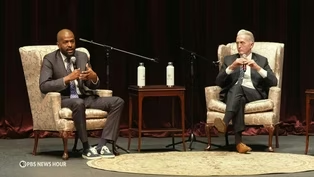
AI content spreads confusion and misinformation, critics say
Clip: 10/22/2025 | 5m 58sVideo has Closed Captions
AI content supercharges confusion and spreads misleading information, critics warn
In the last few years, video and other content created with artificial intelligence have begun to flood almost every part of the internet. It has appeared everywhere from Spotify to the Kindle Store. But on social media, it is almost unavoidable. William Brangham takes a deep dive into the world of "AI slop."
Problems playing video? | Closed Captioning Feedback
Problems playing video? | Closed Captioning Feedback
Major corporate funding for the PBS News Hour is provided by BDO, BNSF, Consumer Cellular, American Cruise Lines, and Raymond James. Funding for the PBS NewsHour Weekend is provided by...

AI content spreads confusion and misinformation, critics say
Clip: 10/22/2025 | 5m 58sVideo has Closed Captions
In the last few years, video and other content created with artificial intelligence have begun to flood almost every part of the internet. It has appeared everywhere from Spotify to the Kindle Store. But on social media, it is almost unavoidable. William Brangham takes a deep dive into the world of "AI slop."
Problems playing video? | Closed Captioning Feedback
How to Watch PBS News Hour
PBS News Hour is available to stream on pbs.org and the free PBS App, available on iPhone, Apple TV, Android TV, Android smartphones, Amazon Fire TV, Amazon Fire Tablet, Roku, Samsung Smart TV, and Vizio.
Providing Support for PBS.org
Learn Moreabout PBS online sponsorshipGEOFF BENNETT: In the last few years, video and other content created with artificial intelligence has begun to flood almost every part of the Internet, and, on social media, it's almost unavoidable.
William Brangham takes a deep dive now into the world of what's known as A.I.
slop.
WILLIAM BRANGHAM: Have you seen these, cats competing in Olympic diving?
What about this, a baby who somehow gets control of a jumbo jet, or this security camera footage of bunnies enjoying a homeowner's trampoline?
Each of those has been seen hundreds of millions of times, and they are all fake.
There are a type of artificially generated content that is flooding social media.
Critics have dubbed it A.I.
slop because it's quick and easy to produce and created by artificial intelligence.
MAX READ, Author, "Read Max": It's the stuff that you see in your feed that you didn't necessarily ask for that looks a little bit off, that was clearly generated quite quickly and quite cheaply, and is usually designed to be scrolled through for a small amount of engagement and then moved past.
WILLIAM BRANGHAM: It's not just flying babies and bouncing bunnies.
Some of the fakery is being posted from the most powerful office in the country.
A.I.-GENERATED LARA TRUMP: Breaking now, President Donald J. Trump has announced a historic new health care system.
WILLIAM BRANGHAM: President Trump shared this fake video meant to look like a FOX News segment of him promoting a nonexistent medical technology.
A.I.-GENERATED PRESIDENT TRUMP: Every American will soon receive their own med-bed card.
WILLIAM BRANGHAM: And this, fake video of Barack Obama being arrested in the Oval Office, plus other more clearly phony images, Trump as king, as pope, as a buff Jedi Knight from "Star Wars."
Democrats do it too, most notably California Governor Gavin Newsom here poking fun at the president's posts.
AIDAN WALKER, Internet Culture Researcher: A part of the president's social media strategy is reflecting the world that his supporters and honestly most Americans live in.
And that online world now involves A.I.
slop.
WILLIAM BRANGHAM: This so-called slop on the Internet is nothing new.
AIDAN WALKER: You just open your e-mail inbox at any time since the Internet's inception and you will see spam.
WILLIAM BRANGHAM: But starting around 2023, with the advent of free or low-cost A.I.
generating tools, it has become possible to mass-produce this material with very little effort.
HANY FARID, University of California, Berkeley: We have always been able to manipulate images, audio and video.
But what has changed is who can do it, how fast they can do it.
There's zero barrier to entry, and, of course, they now have distribution channels.
This is anybody with a keyboard and Internet connection making any image, any video, anybody doing or saying anything and then distributing it to the world instantaneously through social media.
And that is a radically different landscape that we are facing than we have faced in the past.
WILLIAM BRANGHAM: Like A.I.
itself, A.I.
image and video tools have advanced incredibly quickly.
A few years ago, someone tried to animate actor Will Smith eating spaghetti and it looked like this, deformed and glitchy and clearly not real.
But today's tools using this same benchmark can make this.
HANY FARID: And there's almost no limits to what it can do other than limits imposed by the A.I.
company that says we don't want you creating certain types of content because it's either illegal or harmful.
WILLIAM BRANGHAM: Two of the biggest players, Google and OpenAI, ban creating certain content, things that are sexually explicit or promote things like violence or terrorism or content that could cause someone to hurt themselves.
But many have found ways around those guardrails.
Now it's important to note that not all A.I.-generated content is considered slop.
Some artists and musicians have embraced this frontier using these tools.
A.I.
slop in particular is typically made at scale to try and draw eyeballs online and thus earn money for its creators.
MAX READ: The kinds of people who make slop tend to be entrepreneurs and hustlers often in relatively low- or middle-income countries that have good knowledge of English and a lot of widespread Internet connectivity.
So you see it a lot in India, Pakistan, Kenya, Nigeria, Brazil.
It's pretty hardworking guys trying to make a buck off of a business proposition that has been offered to them by Facebook itself or by TikTok itself.
WILLIAM BRANGHAM: The best-performing material plays on strong emotional responses, like sympathy or fear.
HANY FARID: The very things that you are most likely to click on is by design.
You are being manipulated to steal your time, your attention, and so that these companies can deliver you ads.
WILLIAM BRANGHAM: The tech giants are betting that these A.I.
videos can help keep you glued to their platforms.
Both Meta and OpenAI recently announced consumer-friendly ways to create and watch short-form A.I.
videos.
In addition to the environmental toll from this technology, A.I.
requires huge amounts of electricity and water, critics say A.I.
slop just further supercharges the stew of confusion and misleading content on the Internet and creates yet another hook that keeps people lost in their phones.
AIDAN WALKER: You live online now, and suddenly this online environment has been filled with a much higher volume of slop.
On your typical Instagram Reels session, you're looking at 20 different videos and 15 of those videos now are A.I.
slop videos.
That's 15 chances that you're missing to connect with a friend of yours, to learn something new, to find some joke that you can send to the group chat and forge a new bond with people over.
WILLIAM BRANGHAM: And, critics argue, yet another tool that blurs the line between reality and fact.
For "PBS News Hour," I'm William Brangham.
News Wrap: East Wing undergoing renovation for ballroom
Video has Closed Captions
Clip: 10/22/2025 | 4m 21s | News Wrap: White House says entirety of East Wing undergoing renovation for ballroom (4m 21s)
Nicholas Sparks co-authors new novel with M. Night Shyamalan
Video has Closed Captions
Clip: 10/22/2025 | 8m 3s | Nicholas Sparks teams up with M. Night Shyamalan to co-author supernatural love story (8m 3s)
Teen with disabilities mistakenly held in immigration raid
Video has Closed Captions
Clip: 10/22/2025 | 7m 48s | Mother speaks out after teen with disabilities mistakenly arrested in immigration raid (7m 48s)
Trump sanctions Russian oil companies as peace talks falter
Video has Closed Captions
Clip: 10/22/2025 | 4m | Trump sanctions Russian oil companies as his efforts to end Ukraine war falter (4m)
U.S. ranchers push back on Trump’s Argentina beef deal
Video has Closed Captions
Clip: 10/22/2025 | 5m 32s | 'This is going to hurt us': U.S. ranchers push back on Trump’s Argentina beef deal (5m 32s)
Viral debates and their impact on our ability to disagree
Video has Closed Captions
Clip: 10/22/2025 | 9m 54s | The rise of viral debate videos and their impact on our ability to disagree (9m 54s)
Why millions are facing a spike in health care costs
Video has Closed Captions
Clip: 10/22/2025 | 5m 43s | Why millions of Americans are facing a spike in health care costs (5m 43s)
Providing Support for PBS.org
Learn Moreabout PBS online sponsorship
- News and Public Affairs

FRONTLINE is investigative journalism that questions, explains and changes our world.

- News and Public Affairs

Amanpour and Company features conversations with leaders and decision makers.












Support for PBS provided by:
Major corporate funding for the PBS News Hour is provided by BDO, BNSF, Consumer Cellular, American Cruise Lines, and Raymond James. Funding for the PBS NewsHour Weekend is provided by...






